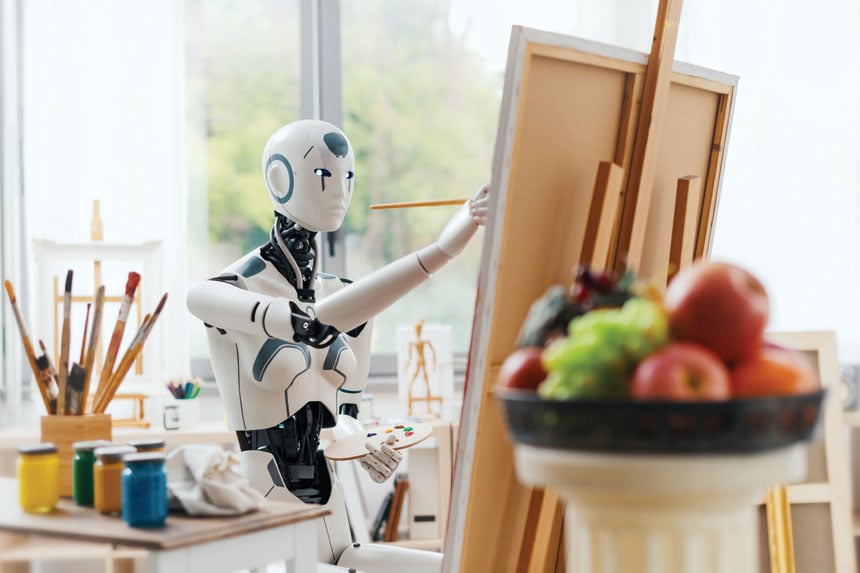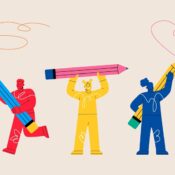In the tech industry’s race to suffuse everything with some kind of artificial intelligence, some expressions of those tools have emerged that are more positive than others. Yes, A.I. may help doctors find and map tumors more quickly. And yes, A.I. can help in crop yield analysis, weather mapping, and space exploration. But it should absolutely not be used as a substitute for thought and creativity.
The role of generative A.I. in the arts is controversial. Actual writers, musicians, and artists have nothing but disdain for platforms that “scrape” or “train on” their work without permission. These programs allow a user to simply enter a prompt, which the A.I. interprets and then spits out whole novel-length documents that can be laden with the thoughts and words of real writers, baked into a plagiarized souffle. But entering a prompt doesn’t make you a novelist any more than photographing a painting makes you a painter.
Some members of the pro-A.I. crowd accuse artists of gatekeeping, alleging that anti-A.I. sentiment prevents certain people from entering artistic fields. Well, yes. Writers, artists, and musicians study, work, practice, and train to ply their disciplines. You get better the more you work at something. And while some people will never get better at creative disciplines, it’s the doing it yourself that’s the important part. I occasionally enjoy playing basketball, but I’ve never entertained the delusion that Tyrese Haliburton is keeping me from the NBA.
The metric of success in the arts is always, always built on a foundation of hard work and talent, not on entering a few words into a program to see what it gives you. If you aren’t prepared to put in the thousands of hours that it takes to be good at the arts, then, quite frankly, do something else.
And it bears repeating that being better at anything else, from auto repair to gardening to flying a plane, also takes thousands of hours of study and practice.
On top of that, a recent MIT study showed that the reliance on certain A.I. platforms caused users’ engagement to suffer as they “consistently underperformed at neural, linguistic, and behavioral levels.” So not only is the produced work unoriginal and, in some cases, outright stolen from existing copyrighted material, the entire process may be harmful.
The damage that can cause to the foundations of learning and cognition isn’t artificial; it’s all too real.
This article is featured in the September/October 2025 issue of The Saturday Evening Post. Subscribe to the magazine for more art, inspiring stories, fiction, humor, and features from our archives.
Become a Saturday Evening Post member and enjoy unlimited access. Subscribe now




Comments
The use of AI in plagiarism has become common enough that AI detectors are now available online, some for free and others, more powerful, by subscription.
Recently, just as a quick test, I ran the Acknowledgments page from my forthcoming book “SURRENDER! The End of World War II, and the Pens That Signed the Axis Death Warrants” through one of the free detectors. Apparently, my writing style reads to some extent like AI; the detector didn’t complain about roughly half of the text, but of the rest it flagged some paragraphs as AI and others a probably AI, and the whole thing was labeled as having been partially written by AI.
What the explosion of AI is, is an actual war pitting artists and writers against machines programmed to steal thought and vision for profit, and the former seem doomed to lose. But they won’t stop doing what they do. Despite the very real need to earn a living, the soul of an artist is driven by the art, not the money.
You hit the nail on the head starting in paragraph 3. Some members of the pro-A.I. crowd that allege the anti-A.I. sentiment prevents certain people from entering artistic fields, are the very ones looking to use A.I. as their total crutch to take credit for what they didn’t create, and need to be weeded-out.
I agree with much of what the writer says about AI. It is a revolutionary tool to be used with care and not misused. I see AI as the new “Computer Science” or “Information Systems” of this generation and a spawn from IT. Investing in companies developing AI is a good move now for those seeking a good investment. It is here to stay. Sure, there will be and are “bugs” along the way but as they are ironed on and the technology refined it will be helpful to all.